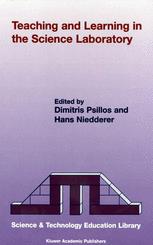

Most ebook files are in PDF format, so you can easily read them using various software such as Foxit Reader or directly on the Google Chrome browser.
Some ebook files are released by publishers in other formats such as .awz, .mobi, .epub, .fb2, etc. You may need to install specific software to read these formats on mobile/PC, such as Calibre.
Please read the tutorial at this link: https://ebookbell.com/faq
We offer FREE conversion to the popular formats you request; however, this may take some time. Therefore, right after payment, please email us, and we will try to provide the service as quickly as possible.
For some exceptional file formats or broken links (if any), please refrain from opening any disputes. Instead, email us first, and we will try to assist within a maximum of 6 hours.
EbookBell Team

0.0
0 reviewsScope of the book There is an on-going debate regarding the role of labwork in science education, which dates back several decades and which illustrates the conviction and interest of teachers, researchers and policy-makers world-wide in the value of laboratory work for understanding science. This is evident in more recent books and studies regarding the laboratory, which mainly refer to countries with a considerable tradition in practical work in science education (Woolnough & Alsop 1985, Hodson 1993, Hegarthy-Hazel 1990, Wellington 2000). Yet in discussing research studies on labwork, several authors express their concern about its effectiveness in facilitating students' understanding of various aspects of scientific inquiry. They point out a comprehensive re-conceptualisation of the aims of labwork and, as a consequence, of investigating what the students actually learn in different contexts (Lazarowitz & Tamir 1994, Tobin & Tippins 1993, Lunetta 1998). It has also been argued that the relationship between instructional activities and student learning in labwork needs more attention than it has been given in science education research (Leach & Paulsen 1999). It appears that the case for research-based labwork emerges in several quarters in science education, particularly among researchers. This book presents and discusses a variety of laboratory practices and their effectiveness. The studies take into account recent theoretical developments and empirical results concerning students' understanding of scientific inquiry. A whole chapter is devoted to technological advances offering new learning opportunities for the students and teaching facilities for the teacher.